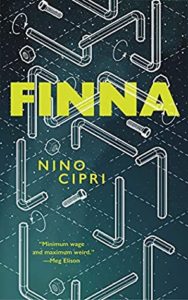
Nominations for both Hugo and Nebula Awards certainly put Finna on my radar, but I knew next-to nothing about Nino Cipri’s debut novella before reading it—in fact, I mistakenly thought that the title was a reference to the African American slang for “going to” (by way of the Southern US idiom “fixing to”) rather than the Swedish word for “find.” So it was a surprise to find a portal fantasy taking place in a twisted IKEA stand-in. Fortunately, I enjoy portal fantasies, so the surprise wasn’t a disappointment.
Finna stars Ava, a junior employee at a soul-sucking IKEA-like home decor chain, who just wants to make it through her day without running into her coworker and erstwhile lover Jules. Unfortunately for them both, it turns out that their store is a nexus for travel between universes, and they are tasked with retrieving a missing customer, with the threat of unemployment looming if they fail.
It’s a fairly simple plot—retrieve a missing person from a parallel universe—that unfortunately doesn’t have much to offer. In my experience, there are two ways to make a portal fantasy compelling. The first is atmospheric, capturing the wonder of hidden worlds, whether they be delightfully magical, terrifying, or something in between. The second is by exploring the differences between worlds, whether that comes in the form of culture clashes or in a multiverse storyline presenting different ways our world could have been. Finna gestures at both but accomplishes neither. Ava and Jules alternately express both wonder and terror upon seeing new worlds, but neither emotion filters through to the reader. And these worlds do represent a multiverse, with multiple copies of each person, but the existence of so many possibilities is used mostly to offer trite encouragement in difficult situations. The novella hints at a deeper dive into the differences between versions of a person but ultimately retreats to a convenient but unsatisfyingly shallow position.
Moving past the main plot, Finna also offers an anti-capitalist critique and an exploration of the two main characters working through a difficult breakup. The former is again shallow and unsatisfying, with a few winks and nods to the initiated amidst a eye-rollingly cartoonish portrayal of an evil corporation. The latter, on the other hand, is quite good and goes a long way toward redeeming the novella as a whole. While the friends-to-lovers trope is well-trod in speculative fiction (and fiction as a whole), lovers-to-friends feels fresh. Cipri paints a compelling portrait of the failure of the romance between Ava and Jules, with plenty of personal flaws on both sides and a heap of emotional turmoil in the aftermath. And then they use the portal fantasy plot to drive a partial reconciliation that feels organic and thoroughly earned, even given the compressed timeline.
If Finna had not been such a short novella, I likely would have put it down in frustration after seeing such a lifeless portal plot and a mustache-twirling corporate villain. But if I had, I would’ve missed a carefully portrayed and truly fresh interpersonal plot. That subplot isn’t enough to push my review into generally positive territory, but it was certainly enough that I appreciated finishing.
Recommended if you like: good interpersonal plots regardless of backdrop, particularly lovers-to-friends.
Can I use it for Bingo? I plan to use it for the New-to-You Author square (hard mode, because I knew almost nothing going in), but it will also work for Trans/NB Character (hard mode), Found Family (hard mode), or Debut Author.
Overall rating: 11 of Tar Vol’s 20. Three stars on Goodreads.
